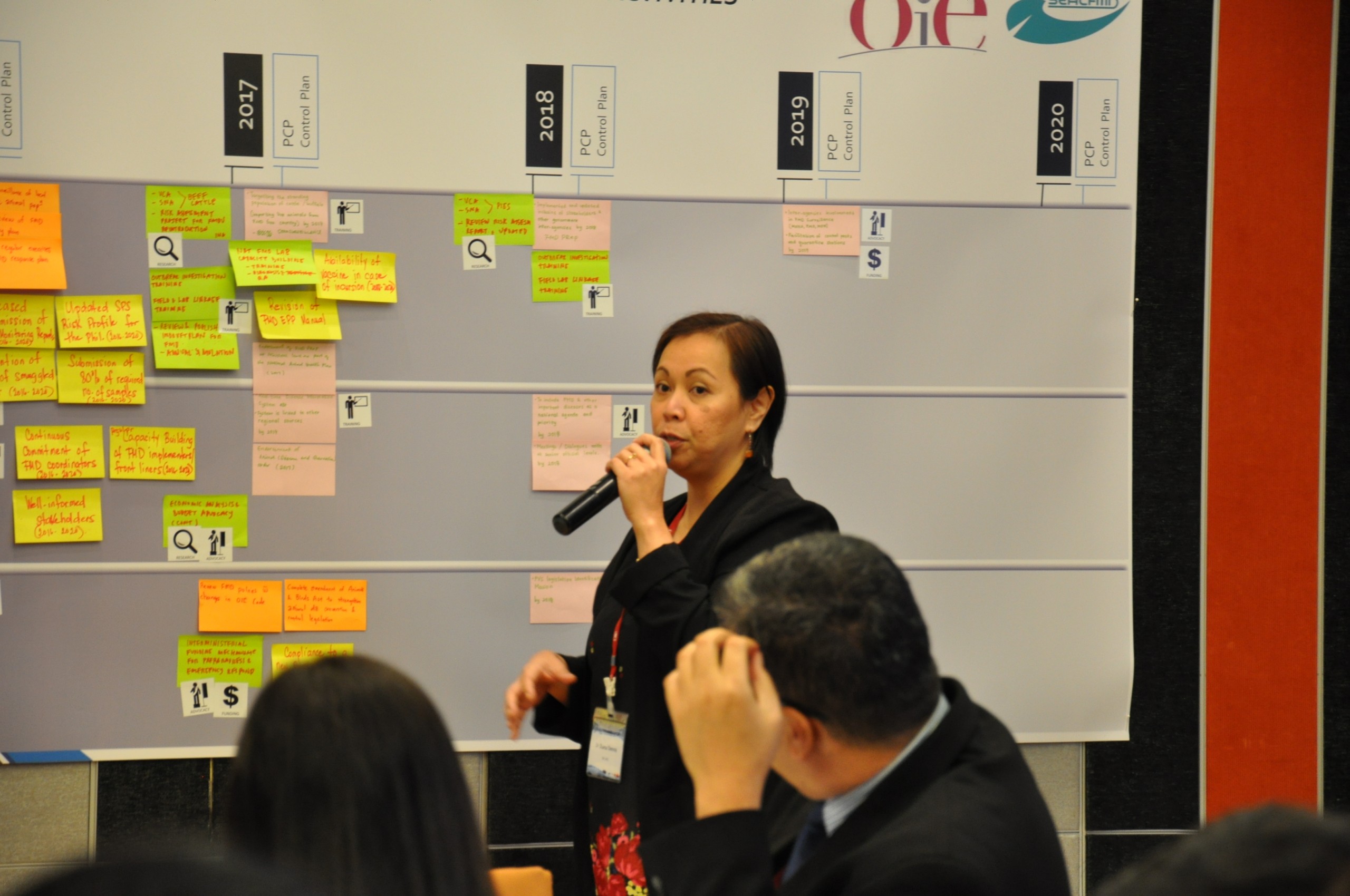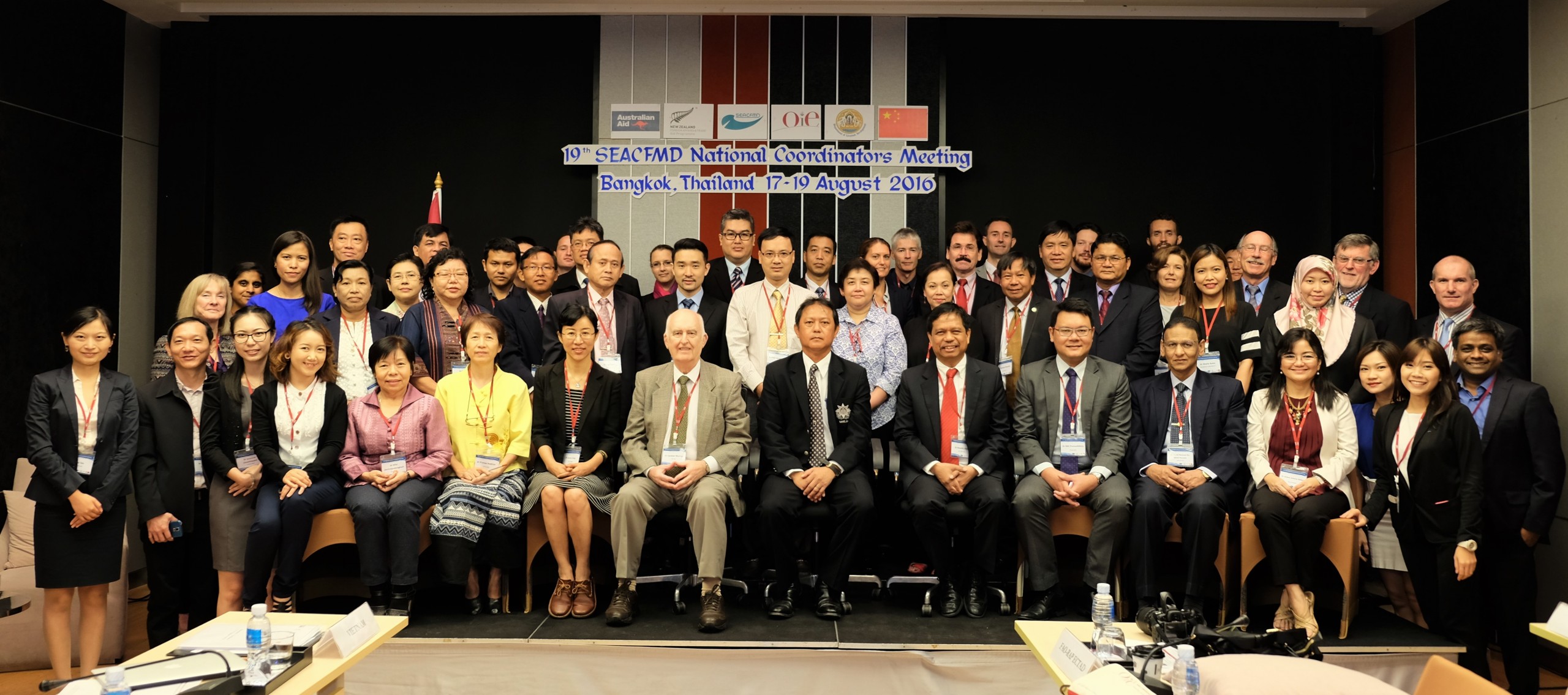The SEACFMD National Coordinators Meeting was held in Bangkok, Thailand on 17-19 August 2016. A total of 55 participants attended including the SEACFMD National Coordinators from 12 Member Countries, donors, partners and observers. The meeting was opened by Dr Prapas Pinyocheep, Director of the Bureau of Disease Control and Veterinary Services, Department of Livestock Development, Thailand, who welcomed participants to Bangkok and highlighted the achievements of SEACFMD over the preceding years. Dr Gardner Murray, President of the OIE Sub-Commission for FMD Control in South-East Asia, China and Mongolia, summarised the key objectives of this meeting, highlighting the importance of a strategic implementation plan in each Member Country to guide progression consistent with the SEACFMD Roadmap and FAO/OIE Progressive Control Pathway for FMD (PCP-FMD).
Participants reviewed the progress of the priority actions recommended at the 22nd OIE SEACFMD Sub-Commission Meeting and the 18th National Coordinators Meeting. Participants were also provided with an update on the regional FMD situation. Significant epidemiological changes include the incursion of the O/ME-SA/Ind2001d strain in Lao PDR and Vietnam and serotype A viruses in Myanmar. Subsequently, representatives from Lao PDR, Vietnam and Myanmar presented their investigation activities and outcomes in the above-mentioned outbreaks. In the following workshop, participants identified the key FMD risks for Member Countries, including delayed responses due to under-detection/under-reporting of FMD outbreaks; illegal cross-border movements of livestock and their by-products; poor biosecurity practices at farms; and low vaccination coverage. Risk-mitigation approaches were also identified, including optimising FMD surveillance and reporting systems and sending more samples to reference laboratories on a regular basis; enhancing multi-national and multi-sectoral collaboration on animal movement management; launching advocacy campaigns to increase biosecurity awareness; developing zoning approaches and tailor vaccination campaigns using a combination of broadscale and targeted vaccination strategies campaigns.
In the afternoon, a poster tour was held during which Member Countries presented their country’s FMD situation, key activities to implement the 3rd edition of the SEACFMD Roadmap, and major challenges. Given the majority of Member Countries have not yet applied for OIE endorsement of National Plans for FMD Control nor have experience with PCP-FMD evaluation, a workshop was facilitated to advise participants about relevant guidelines. Country delegates discussed the questions in the PCP-FMD checklist and underlined those that may be difficult to address. OIE SRR-SEA confirmed its willingness to provide targeted support based on the workshop outcomes, to assist Member Countries prepare for OIE endorsement of National Plans, and for PCP evaluation.
The second day started with a wrap-up of the previous day’s activities, followed by a facilitated workshop on the Roadmap and PCP implementation plan for 2016-2020. The regional implementation plan was reviewed and, subsequently, strategic targets aligned with the regional strategy were identified by each country delegate. In the afternoon, a poster tour was held during which partners presented their FMD research and prevention activities. This was followed by a workshop on identifying the SEACFMD research priorities for 2016-2020. Participants reviewed past and present research activities/achievements and outlined their priority research needs for the following 5 years. The most common research needs/gaps included technical advances in FMD detection and surveillance; design and optimisation of broadscale FMD vaccination strategies; identification of cost-effective biosecurity measures for large-scale applications; analysis of the regional value chain of animals and animal products. It was agreed that the OIE SRR will develop a regional SEACFMD research strategy for 2016-2020 based on the workshop outcomes. In the following session, the SEACFMD Roadmap manuals were reviewed and National Coordinators were urged to submit case study activities/outcomes to annex to the manuals, which would allow for experience sharing and development of collaboration.
On the third day, country delegates presented their national implementation plans of the SEACFMD Roadmap. In the subsequent workshop, Member Countries detailed their action plan for 2016-2017, which was in line with the implementation plan targets they identified on the previous day. Potential bi/multi-lateral collaborations that could contribute to the implementation activities were also discussed. In the last session, Dr Murray re-emphasised that the sustainability of the SEACFMD Campaign requires strong commitment from Member Countries and continued support from donors. He also presented the preparation work for the 23rd SEACFMD Sub-Commission Meeting, which will be held in March 2017 in Cambodia. In the end, recommendations out of this meeting were reviewed and discussed. Key recommendation included agreeing that exotic FMD viruses O/ME-SA/Ind-2001d and A/Asia/GVII from South Asia pose serious risks to SEACFMD Member Countries, and that OIE SRR-SEA should develop a policy paper and recommendations for risk management approaches; encouraging all Member Countries to continually evaluate the risk of FMD incursions and take protective measures. It was also agreed that a regional PCP Evaluation Committee would be established to review Member Country applications for PCP status for endorsement by the Sub-Commission.
It is worthy to mention that all the workshops in the current meeting were organised in a novel way. In details, participants were grouped based on the country’s PCP-FMD stage or on projects. A kick-off presentation was conducted to explain the categories of the targets/activities to be identified, which were pre-printed on a white board. Subsequently, each group discussed and outlined their priority targets/activities in the sticky notes, and placed them in the respective category. Group representatives briefly explained their outputs and a quick on-the-spot analysis was performed to draw primary conclusions. Deep-dive analysis will be conducted by OIE SRR after the meeting and conclusions will be circulated through the final meeting report. The new format of workshops have proved to be very productive, with increased interactions, improved outputs and very positive comments from participants.

